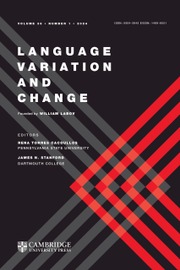Article contents
Consonant weakening in Florentine Italian: A cross-disciplinary approach to gradient and variable sound change
Published online by Cambridge University Press: 12 August 2008
Abstract
Few acoustic studies of the intervocalic consonant lenition in central Italian dialects (a process known as Gorgia Toscana) have been undertaken. This study examines speech data from Florentine Italian in order to describe the process of Gorgia Toscana quantitatively and to assess the roles of physiological, perceptual, phonological, and social factors in the process. Results of acoustic and statistical analysis indicate gradient and variable output, with certain patterns occurring in the variation. The observations that emerge from the data cannot all be accounted for if Gorgia Toscana is characterized as a purely phonetic, phonological, or socially driven process of sound change. Rather, different aspects of the process are attributed to different motivators: gradience and velar preference to articulator movements, resistance of nonvelar lenition to perceptual constraints, targeting of a natural class and categorical weakening to abstract featural representations, and intersubject variation in velar lenition to external social factors.
- Type
- Research Article
- Information
- Copyright
- Copyright © Cambridge University Press 2008
References
- 9
- Cited by


